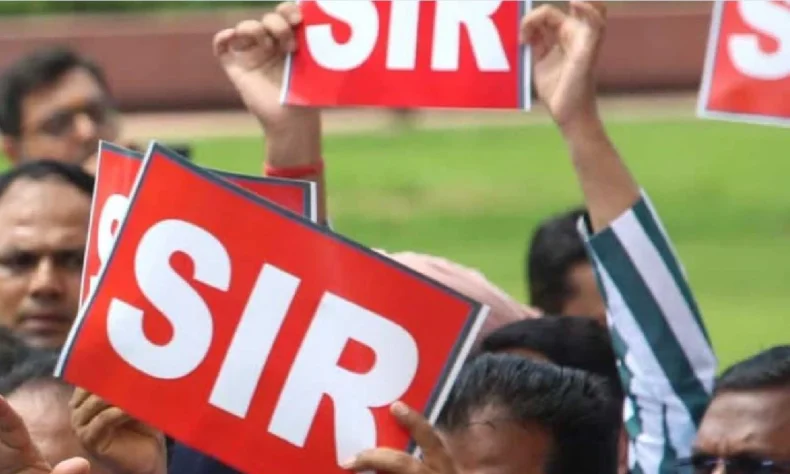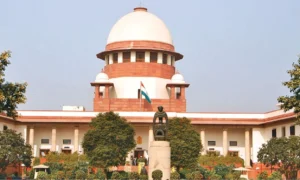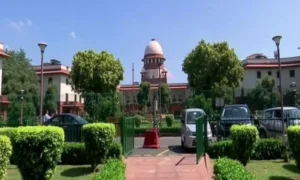
By Sujit Bhar
Two days before the commencement of the assembly elections in Bihar, the Election Commission of India (ECI) initiated a Special Intensive Revision (SIR) of the voter lists in West Bengal. The timing, scale, and intensity of the move immediately ignited political and social unrest across the state. On its first day alone, nearly 80,000 booth-level officers (BLOs) distributed 18 lakh enumeration forms—all to be filled, verified and returned before December 4. With over 7.6 crore voters in West Bengal expected to complete this exercise within a little more than a month, the state appears to have been thrust into a bureaucratic marathon with grave social and human consequences.
The ECI’s stated objective behind SIR is to ensure an accurate and updated electoral roll—a cornerstone of free and fair elections. However, the hasty and coercive execution of the process, especially in a politically charged environment like West Bengal, threatens to destabilize communities, overburden public servants, and potentially disenfranchise millions. Worse, it risks replicating the chaotic scenes that played out in Bihar, where mass deletions, errors, and dubious entries left thousands of legitimate voters stripped of their democratic identity.
As the Calcutta High Court prepares to hear a petition demanding court-monitored oversight of the SIR, it becomes imperative to critically examine whether such a massive revision exercise—executed in haste and without adequate safeguards—could cause more harm than good.
A BUREAUCRATIC MESS
At the heart of the SIR operation are the BLOs—the unsung grassroots functionaries tasked with updating and verifying voter lists. In West Bengal, most BLOs are school teachers, clerical staff, or lower-level government employees. Typically, they handle these duties during designated periods of electoral revision, but this time the story is dramatically different.
Under the current SIR, BLOs have been ordered to conduct fieldwork for at least four hours daily—after completing their regular school or office duties. Effectively, this means that a teacher who begins her day at 9 am may not return home before midnight. For many, especially women working in semi-urban and rural areas, this arrangement is not just exploitative, but unsafe. BLOs initially resisted, demanding that the work be counted as official duty, compensated appropriately, and conducted with proper security measures. After an initial stand-off, the ECI relented, declaring the work “official duty”—but the damage was done. Teachers’ schedules were upended, students were left in limbo as schools struggled to function normally, and resentment began to simmer among the very people entrusted with protecting electoral integrity.
This ground-level crisis reveals the bureaucratic insensitivity embedded in the hurried SIR. The ECI’s decision to divert educational and administrative staff into an intensive, high-stakes verification process— without adjusting for their existing responsibilities or providing adequate logistical support—exemplifies a top-down administrative style that prioritizes procedural completion over human feasibility.
SURVEILLANCE, DISTRUST AND FEAR
The Trinamool Congress (TMC) has described the SIR as a “political operation aimed at deleting genuine voters.” General Secretary Abhishek Banerjee has directed all party booth-level agents (BLAs) to “not leave BLOs unattended for even a minute,” signalling the party’s deep suspicion of the ECI’s intentions. In a virtual meeting with party leaders, Banerjee went further: “If the BJP was serious about finding infiltrators, they should have carried out SIR in Assam, Meghalaya, or Tripura—not Bengal.”
This comment reflects the larger political anxiety in the state. For the TMC, the SIR echoes the fears that gripped Assam during the National Register of Citizens (NRC) process, where lakhs of legitimate residents, including the poor and marginalized, were rendered stateless due to bureaucratic errors or lack of documents. The fear is that Bengal could be next—that SIR could become a tool to systematically purge voter lists under the guise of “cleansing infiltration”.
The psychological toll is already visible. Reports of suicides linked to SIR anxiety—such as in Panihati, Dinhata, and Illambazar—have surfaced. In these cases, individuals reportedly took their own lives fearing that they or their families would be struck off the voter rolls. The haunting resemblance to the NRC-triggered suicides in Assam cannot be ignored. What began as an administrative process has become a source of mass insecurity, where citizenship itself feels conditional.
The Bihar experience offers a grim warning. In that state, the revision of electoral rolls led to widespread irregularities: hundreds of voters listed under the same address, many with “0” as their house number, and thousands whose names disappeared without explanation. The revision exercise, meant to bring precision, instead brought pandemonium. Political parties accused each other of manipulating the lists, and voters faced humiliation and disenfranchisement.
The parallels with Bengal are worrying. Both states share high population densities, migratory labour patterns, and large rural electorates with limited digital literacy. Conducting an intensive enumeration exercise in such conditions—and that too within a compressed timeline—is a recipe for errors. The very idea of making every voter fill and return a new form within a few weeks is administratively unrealistic. The risk of omission, duplication, or wrongful deletion grows exponentially under such constraints.
Moreover, the ECI’s data-handling mechanisms are not foolproof. Past experiences show that digital synchronization between field data and central electoral databases often suffers from lag, inconsistencies, and human error. In the Bihar case, errors were so severe that the ECI had to publicly acknowledge discrepancies. Bengal, given its size and political volatility, may face consequences on a far greater scale.
THE HUMAN COST
The SIR’s human impact extends beyond electoral statistics. For government teachers drafted into BLO work, the exercise has meant exhaustion, exposure to public anger, and moral distress. Many report being heckled or threatened by citizens fearing deletion from the rolls—a tragic irony, given that BLOs have little control over policy decisions. The climate of fear and suspicion has created a toxic working environment, where every form distributed or signature collected becomes a potential flashpoint.
Meanwhile, ordinary citizens—particularly the elderly, daily-wage workers, and women—are struggling to navigate the paperwork. In rural Bengal, documentation is often incomplete, addresses ambiguous, and literacy levels low. Many households share informal or unnumbered dwellings, a reality the bureaucratic form seldom accommodates. As a result, genuine voters risk exclusion simply because they cannot correctly fill a form or locate old identification papers.
This is not merely a procedural inconvenience. For millions of poor citizens, being struck off the electoral roll means losing their voice in governance—and, symbolically, their belonging to the nation itself.
In response, the Trinamool Congress has announced the establishment of 6,200 voter assistance camps across Bengal—covering 2,861 municipal wards and 3,345 gram panchayats—to help people verify their names, submit claims, and report irregularities. On paper, this initiative aims to empower citizens against potential bureaucratic overreach. In practice, it also serves as a potent political mobilization tool. By positioning itself as the protector of the voter, the TMC seeks to turn administrative anxiety into electoral sympathy.
The irony, however, is that this parallel mechanism could deepen polarization. BLOs—already stretched thin—may now find themselves caught between the ECI’s directives and party surveillance. If mistrust between the ECI and state actors continues to escalate, the integrity of the electoral process itself could be compromised long before ballots are cast.
A MASSIVE SYSTEMIC PROBLEM
The SIR episode underscores a deeper malaise in India’s electoral administration—the conflation of accuracy with aggression. While the ECI is constitutionally mandated to maintain clean and updated rolls, the methods it adopts increasingly resemble coercive campaigns rather than civic exercises. Instead of promoting participation, they instil fear.
The idea of “finding infiltrators” through voter list revision is conceptually flawed. Citizenship verification and voter eligibility are distinct legal domains. Using electoral revision as a surrogate for citizenship screening weaponises the process, transforming a democratic register into a policing tool. This not only violates the spirit of universal suffrage, but risks turning the ECI—historically one of India’s most trusted institutions—into a partisan actor in public perception. If the ECI truly seeks to ensure the integrity of electoral rolls while safeguarding citizens’ rights, several corrective steps are urgently needed.
- Extend the timeline and decentralize the process: The current deadline of December 4 is unrealistic. The ECI should extend the timeline by at least three months, allowing BLOs to work within regular hours and ensuring thorough verification. Decentralizing data entry and review to district-level committees can also reduce the pressure on a single bureaucratic chain.
- Introduce digital self-verification tools: Citizens should be allowed to verify and update their details through secure online portals and mobile applications. Aadhaar-linked verification (with strict privacy safeguards—and now that the Supreme Court has said that Aadhaar is definitely one of the documents that can be presented as proof) can help reduce duplication without forcing physical enumeration on every voter.
- Independent oversight and grievance redressal: The Calcutta High Court’s intervention is a welcome step. A court-monitored mechanism, or at least an independent ombudsman, should oversee the process to ensure transparency and prevent arbitrary deletions. Local grievance cells must be established to handle voter complaints in real time.
- Protect teachers and BLOs: BLO work should not interfere with essential public services like education. The ECI must either appoint dedicated field workers or schedule BLO duties within official hours. Security and insurance cover for BLOs, especially women, should be mandatory.
- Public awareness and confidence-building: Instead of allowing fear to fester, the ECI should launch a public information campaign explaining the purpose, timeline, and safeguards of the revision. Confidence-building measures are essential in states like Bengal, where political distrust runs deep.
- Data audit and accountability: Any instance of wrongful deletion or duplication must trigger automatic review. Accountability mechanisms—including penalties for data-entry errors or manipulation—should be institutionalized.
PATIENCE, NOT PANIC IS THE KEY TO DEMOCRACY
The legitimacy of an election depends as much on the accuracy of its rolls as on the faith of its citizens. The ongoing SIR in West Bengal, launched in haste and marred by distrust, risks undermining both. In its zeal to cleanse the voter lists, the ECI may inadvertently erode the very democratic confidence it seeks to uphold.
Administrative efficiency cannot come at the cost of human dignity. A rushed revision that overburdens teachers, frightens citizens, and fuels political paranoia is not reform—it is regression. If India’s electoral democracy is to remain a model for the world, its institutions must remember that the foundation of that democracy lies not in forms or databases, but in the trust of the people.
📰 Crime Today News is proudly sponsored by DRYFRUIT & CO – A Brand by eFabby Global LLC
Design & Developed by Yes Mom Hosting






